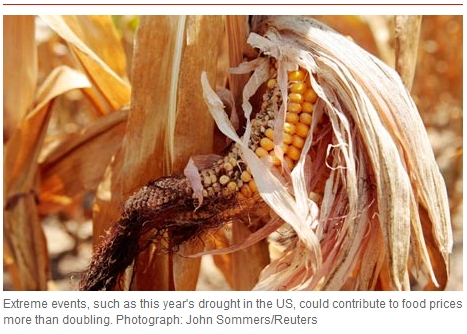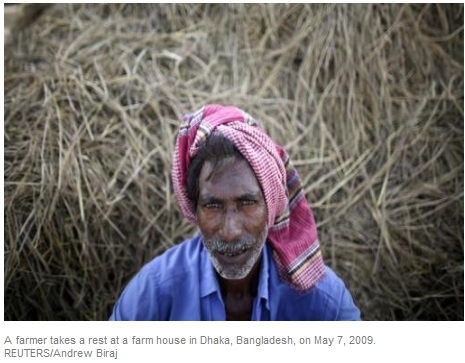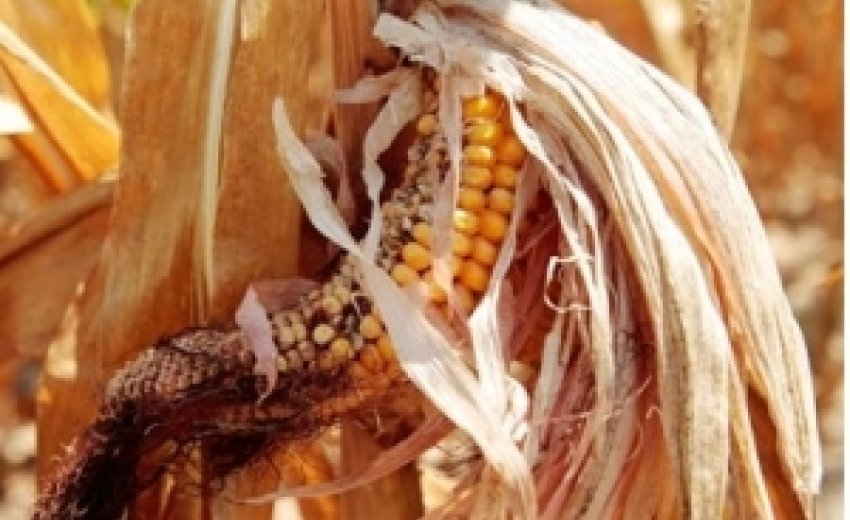Food prices set to more than double if climate change not checked and developing countries not helped to adapt farming
 Wednesday 5 December 2012: Food prices will more than double and the number of malnourished children spiral if climate change is not checked and developing countries are not helped to adapt their farming, food and water experts warned on Tuesday at the UN climate talks in Doha.
Wednesday 5 December 2012: Food prices will more than double and the number of malnourished children spiral if climate change is not checked and developing countries are not helped to adapt their farming, food and water experts warned on Tuesday at the UN climate talks in Doha.
As the UK energy secretary, Ed Davey, and ministers from 194 countries arrived for the high-level segment of the talks, the UN's Committee on World Food Security said the world would need a 75-90% increase in food production to feed the extra 2 billion people expected to be alive in 2050. But climate change could reduce yields worldwide by 5-25% over the same period.
"The poor are especially vulnerable. Climate change will increase the number of malnourished children substantially. Smallholder farmers will be particularly hard hit," said Gerald Nelson, a spokesman for the high-level panel of experts convened by the committee to report on food prospects in the coming 30 years.
Research from Oxfam suggests rice, maize and wheat prices could rise by up to 177% in the next 20 years if climate change is not checked. A combination of extreme events like the drought that affected North America this year and the Russian heatwave in 2008 could raise prices further than two decades of long-term prices, it said.
"Extreme weather means extreme prices. Our failure to slash emissions presents a future of greater food price volatility with severe consequences for the precarious lives of the people in poverty," said Tracy Carty of Oxfam. "If developing countries are left alone to deal with the impacts of climate change, we are going to see millions of people lose their lands and livelihoods. Investing in the resilience of the poorest communities is not just a matter of justice, but a smart investment in a better collective future on this small planet."
"What we are seeing already in northern Kenya and parts of Africa is food prices skyrocketing as farmers' production declines in successive droughts," said Mohamed Adow, climate adviser to Christian Aid. "The number of people is growing, putting extra stress on food production."
Frustration has grown at the Doha conference over the lack of money being offered by rich countries to help farmers adapt to a world likely to see more extreme weather and events that devastate farming. Wealthy nations have broadly emphasised the need for farming to reduce its emissions using new technologies and carbon markets, while developing countries have wanted more emphasis on help for farmers to adapt.
"African negotiators are throwing their hands up in despair, and asking why they should even bother coming to the negotiations. Their cynicism is at its most stark in the agriculture negotiations," said Seyni Nafo, spokesman for the African group in the talks.
A report from the International Centre for Agricultural Research in the Dry Areas (Icarda) and two other international research groups says many of the solutions to climate change and food production are available now, but increased investment and urgent action is needed.
"Many of the solutions to climate change in the dry areas are known," said Mahmoud Solh, Icarda's director general. "They range from water and land management practices to improved crop varieties, and strategies for diversifying traditional crops. The best technologies serve little purpose without a strong policy environment in which they can be put into action, financed and managed."
Bolivia and other Latin American countries with strong indigenous people movements accused rich countries of trying to "commodify" nature by encouraging carbon markets in the same way as forests with the UN's Redd (Reducing Emissions from Deforestation and Forest Degradation) schemes. "It is an attack on nature and common sense that is pushing countries to commodify agriculture with carbon credits as it did with the forests through Redd+, as it intends to do with the oceans and the Earth. Agriculture provides food, give us jobs, gives us life, is the cultural, economic and social basis of our communities, our villages, our producers," said Rene Orellane, head of the Bolivian delegation at the talks. He was backed by India, Argentina, Brazil, Uruguay, Nicaragua, Venezuela and Cuba.
"Carbon markets for agriculture could increase income and reduce emissions. Smallholder farmers can group together to reduce emissions and have a stable income," said Nelson.
But the market approach runs counter to the spiritual beliefs of indigenous peoples. "We have a growing feeling that markets are not the answer. We do not want to put a price on nature. The conference is taking developing countries further and further down the road of markets and away from practical help," said Ariel Chavez, a spokesman for the Latin American regional office of Swedish NGO Diakonia. "We are only hearing about market mechanisms in the conference. But we know that markets are volatile and risky."
-----------------------------------
Related Article:
Poor hit by climate damage despite adaptation - study
Source: alertnet // Megan Rowling
Tue, 27 Nov 2012: LONDON (AlertNet) - Vulnerable people in developing countries are suffering negative impacts from extreme weather and rising seas even when they do take measures to adapt to climate change, says a new study from the U.N. University.

Interviews with nearly 1,800 households in parts of Bangladesh, Bhutan, Gambia, Kenya and Micronesia revealed that two thirds or more have experienced loss and damage from climatic stress factors, despite many taking steps to protect themselves and cope with shifting conditions.
"Loss and damage is a reality today and the numbers are alarming," said Koko Warner, scientific director of an initiative to tackle the problem at the U.N. University Institute for Environment and Human Security (UNU-EHS) in Bonn.
Researchers assessed a range of extreme weather events and slow onset climatic changes, including floods in Kenya, droughts in Gambia, cyclones and saline intrusion in Bangladesh, glacier retreat and reduced rainfall in Bhutan, and sea-level rise and coastal erosion in Micronesia.
Although the majority of respondents had made some effort to deal with these challenges, in Micronesia 92 percent were still experiencing adverse impacts, followed by 87 percent in Bhutan, 72 percent in Kenya, 70 percent in Bangladesh and 66 percent in Gambia, the study says.
On average, more than four fifths of those interviewed based their livelihoods on cultivating crops and livestock keeping, with 85 percent growing food for their own consumption.
"These bare figures are telling us that people are already at the margins of their survival," Warner said in a statement.
Loss and damage - a new concept in climate change research - refers to the negative effects of climate variability and climate change that people have not been able to cope with or adapt to.
For example, in Satkhira, a coastal district of Bangladesh, 81 percent of households reported high salt levels in their soils, compared to only two percent 20 years ago. Rice farmers had learned to adapt to rising salinity until 2009 by planting more tolerant varieties. Then cyclone Aila hit, and in the two subsequent years, rice yields were decimated by a drastic increase in soil salt content, leading to losses of $1.9 million for just the four villages surveyed.
And on the island of Kosrae in the Federated States of Micronesia, where sea-level rise is 10mm a year compared to the global average of 3.2mm, communities have adopted measures against coastal erosion, such as building sea walls and planting trees along the shore. But they say these are not sufficient and some measures have additional costs, such as a loss of cultural heritage due to ancient ruins being dismantled for construction, according to the study.
SOCIAL COSTS
Saleemul Huq, director of the International Centre for Climate Change and Development (ICCAD) and a senior fellow with the International Institute for Environment and Development (IIED), noted that not all impacts can be quantified in financial terms.
"For example in the case of Bangladesh, women have reported reproductive health problems and incidences of miscarriage. It is crucial that these non-monetary costs are identified if they are to be considered by policy makers in climate negotiations," he said.
Negotiators at the U.N. climate conference in Doha, which began on Monday, will continue work on a programme to address loss and damage. Negotiators are considering an international mechanism to deal with the growing problem.
Sven Harmeling of Germanwatch, a Bonn-based environment and development think tank, called on the talks to deliver "concrete outcomes which provide the basis for an adequate response to loss and damage".
The report says communities need support to assess the risks of loss and damage from climate stressors, as well as help to become more resilient, including gaining access to insurance. National governments also require assistance to monitor and respond to climate threats, besides deepening their understanding of the social and economic impacts of climate change, it adds.
"The consequences of a failure to address loss and damage sufficiently would compromise sustainable development, call into question food production in many parts of the world, and jeopardise the resource base of many communities more broadly," the report warns.
The report, Evidence from the Frontlines of Climate Change: Loss and Damage to Communities Despite Coping and Adaptation, was produced for the Climate and Development Knowledge Network (CDKN) Loss and Damage in Vulnerable Countries Initiative.
-------------------------------------
http://www.sikhnet.com/news/five-degrees-ruination
